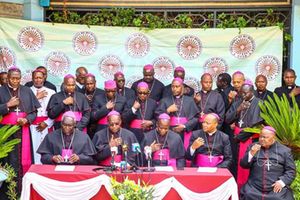
Salaries and Remuneration Commission (SRC) Chairperson Lyn Mengich (left) confers with Cabinet Secretary for Public Service, Performance and Delivery Management Moses Kuria during a media briefing on the National Wage Bill Conference held at Nairobi Safari Club on April 12, 2024.
A centralised payroll system for all public sector workers will help weed out wastage through irregular multiple payments to individuals and ghost workers, several State agencies have proposed.
In the face of a ballooning wage bill that continues to bleed taxpayers, more than five public institutions yesterday noted that converging the data of all workers in national and county governments into a single web-based system could help weed out ghost workers, place proper controls to deter aimless hiring and instil discipline in the usage of public funds.
The system would see dozens of public entities operating manual and other forms of payrolls stopped as they are deemed prone to loss of money.
“Human Resource Information System-Kenya (HRIS-K) is a newly re-engineered web-based system developed to automate all human resource (HR) management functions in the public service. The ultimate objective is to have all payroll systems in the public service migrated to HRIS-K. It will allow integration with other management systems in the public service and faster decision-making,” said Public Service Principal Secretary Amos Gathecha.
The system is meant to be a one-stop portal for all HR services in the public service, which consolidates HR and payroll data for real-time availability and enables easy tracking of workflows and real-time payroll auditing.
The players pitched for a “one-government approach” in the management of HR data in the public service, where all public service employees would be allocated unified payroll numbers (UPNs), with internal audit units strengthened to undertake monthly payroll audits.

SRC chairperson Lyn Mengich (right) welcomes the Cabinet Secretary for Public Service Moses Kuria (left) during a media briefing in Nairobi on April 12.
Gathering for a three-day national wage bill conference in Nairobi yesterday, representatives from the Ministry of Public Service, Public Service Commission (PSC), the Intergovernmental Relations Technical Committee (IGRTC), Council of Governors (CoG) and the State Corporations Advisory Committee (SCAC) also recommended an end to manual payrolls that many counties and entities in national government continue to operate.
At the centre of the conference hosted by the Salaries and Remuneration Commission (SRC) is identifying strategies to lower the public service wage bill to the legal maximum of 35 per cent of government revenues.
Last year, the public sector wage bill of Sh1.1 trillion was 46.6 per cent of Sh2.36 trillion in taxes collected by the Kenya Revenue Authority. This means that the government spent Sh274 billion on salaries and allowances over and above what the law permits.
Kenya’s public service currently employs 968,425 workers, who are expected to gobble up Sh1.17 trillion in salaries and allowances in the year ending June 30.
SCAC also wants private members barred from initiating Bills proposing the creation of state corporations, and Cabinet Secretaries barred from creating new corporations, noting that most of the loss-making entities were created through those avenues.
“The avenue of creation of state corporations through private member Bills creates dissonance with Executive agenda or national government blueprint leading to the establishment of redundant state corporations with overlapping mandates and duplication of functions in various sectors,” said SCAC Chairperson, Philip Mongony.
He said 27 out of the 65 corporations presently established under the Companies Act and operating as subsidiaries of others don’t make business sense.
“No private members Bills on the establishment of state corporations should be entertained and perhaps the President will have to issue an executive order,” he said.
The public wage bill crisis is being experienced even as PSC notes that the public service is operating at 67 per cent capacity, meaning that should the full capacity be put to use, the wage bill could increase by about Sh300 billion.
Urging for balance between employing sufficient numbers and quality of services, PSC Chairman Anthony Muchiri also pitched for the “whole-of-government” approach in staff management, noting that decentralisation of hiring and promotion of staff in the service had affected operations negatively.
IGRTC Chairman Kithinji Kiragu also noted that duplication of roles that have already been devolved between the national and county governments has contributed to the growth in public wage bill,.
He also expressed the need for “one body being playing oversight over the whole issue of human resource management at both levels of government” .











